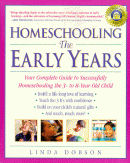Homeschool.com interviewed Linda Dobson. Here are some frequently asked questions about homeschooling preschool and loving every minute of it!
Q: At what age should I start homeschooling preschool?
A: Did you help your child play pat-a-cake, sing the ABC song, tie a shoe? Remember guiding your child until her inner drive sent her walking, talking, self-feeding? Truth is, any thoughtful parent “homeschools” long before her child sets foot in the schoolhouse door. We don’t typically think in these terms. That is because we have been lead to believe there is a specific place to go at a specific time for learning. And that children need specific people who have been “certified” to do so.
You’ve already been homeschooling, even if you didn’t call it that. I like to think of “official” homeschooling as merely continuing what you can been doing. The very natural act of observing what your child learns about the world around her.
You’re already homeschooling, so just keep it up! The thing I remember best about homeschooling with early years children is how much fun it was. The reading of so many books together, reading, reading, and reading some more. The playing games that taught basic math concepts. Writing short stories, poems, and letters to Grandma. Then taking long walks, answering questions or admitting I didn’t know and researching together. And listening to long explanations of how they solved problems while working on their forts in the woods.
Have no fear. Your observation of needs and desires will more than cover the skills outlined in anybody’s curriculum. As well as, trust in your love and in your child’s innate push to learn, The bottom line – no matter where your child learns – is that you as a parent are responsible for her education.
However, by homeschooling, you will also be providing an extra, incredibly important opportunity to yourself and your child. The time together necessary to build strong family bonds and share your family’s values. Learn to observe your child for indications of readiness, desire, and preferred approach to learning, and this will serve you well not only in the present but well into the future.
Start homeschooling your child? No! Continue homeschooling your child!
Q: How long should we homeschool preschool each day?
A: The short answer to this, as kids today are likely to say is, “24/7.” Again, think in terms of being free from the way government schools go about educating children. If you like schedules, stick with one, but realize that everything counts! An evening trip to the grocery store, a weekend visit to the nature center, and even bedtime story hour are times available for learning together.
Some families sit down and do all their academic (book) work for a couple of hours each morning, freeing up the children’s afternoons for personal pursuits. Others scatter bookwork throughout the day, or note that their children might sit down with a math book for 2 weeks straight, then not touch it again for a month. Sometimes families simply go through the course of a day and only take advantage of “teachable moments” as they arise.
As you begin to homeschool, observe what takes place in the course of a week or so. Soon you’ll begin to notice a “rhythm” – your family’s personal rhythm. Here’s where you’ll get your best clues as to the best times for particular pursuits. Just one word of warning: When I did this, I saw that two of my children were night owls! Just about the time my mind and body were winding down, they were just getting into gear! This was definitely an impetus to help them become independent learners very quickly!
Q: What can I do with my toddler and infant when I need some time to focus on an activity with my older homeschooling child?
A: Common sense will dictate what needs to be done for any particular situation. Homeschooling parents have found that infants are easily incorporated into the flow of a homeschooling lifestyle. Since you’re not saddled with a school schedule, you have flexibility. Do more concentrated work during nursing time, sitting in the high chair time, nap time, or even bedtime. Toddlers, full of energy and eager to explore, may require a little more strategic planning.
I asked experienced homeschooling moms how they handle their toddlers. Their answers could be placed in two categories: inclusion or diversion. Most of them prefer inclusion as they noticed the very real educational benefits of this.
Briefly, inclusion means listening to a read-aloud as a family. While many of the books may be “over the toddler’s head,” it’s incredible what they do pick up. It doesn’t hurt the older child to listen to books aimed specifically at the toddler, either. Inclusion also means a “similar” activity. For example, if your older child is writing a poem, a younger child can feel included with a piece of paper and a crayon.
Doing math? The younger child can play with manipulatives, too. Diversion methods include saving special play toys just for the occasion. If everyone moves outside, the little ones can play in the sandbox within easy viewing. Computer games help, as does the occasional Winnie the Pooh video some folks were loathed to confess to playing.
Finally, Dad was an often-mentioned, popular diversion, asked upon arriving home to run to the store or to enjoy the park for “just a little bit.” One piece of advice worth repeating: “Go to the young ones before they’re clamoring, saturate them with attention, then return to your teaching.”
Q: Do I need a computer in order to homeschool preschool?
A: A computer is a learning tool and, like other learning tools, would be nice to have at your disposal. However, no one should decide against homeschooling simply because there isn’t a computer sitting in the living room.
With all the wonderful software available today, a computer can literally turn learning phonics or addition and subtraction into a game. Many homeschoolers are finding that email actually increases their children’s desire to write. And with the additional practice comes additional proficiency more quickly. (Spelling skills improve, too, as most children want their messages to look right.) When your child asks how they make chocolate chips, a visit to the Internet can provide the answer in a matter of minutes.
The flip side of all these benefits of owning a computer is a concern with the possible negative effects on early years children’s health. Concerns from everything from eyesight to back strain and lack of exercise, repetitive motion injuries to radiation exposure. Unfortunately, computers haven’t been around long enough yet for researchers to provide definitive answers to these concerns.
However, moderation is key to ensuring that computer use remains positive for learning. Used computers and software have become a dime a dozen on popular Internet auction sites,. And prices on older computers have dropped dramatically. Also don’t forget that libraries across the country are receiving grants and greatly reduced telephone bills to help them purchase and run computers. They also keep good software on hand for patrons.
Q: What are some of the benefits of homeschooling preschool?
A: Here are the top five.
- Knowledge base — Because they are free of the government school approach to learning, homeschoolers generally find their children learn more in a shorter period of time. This may be credited to your deep knowledge of your children’s needs and interests as you focus on just a few children instead of a classroom full. You can easily tune in to how your child learns best, know “when” is a good time to pursue something, and build on strengths and shore up weaknesses.
- Increased social opportunities — I know, I know. If you’ve been doing any research on homeschooling at all you’ve come across critics’ claims. Ones that say homeschooled children are chained to kitchen tables all day long and so will be socially retarded as they enter adulthood. I don’t believe any negative claim about homeschooling has been as off the mark as this one. Not only does homeschooling allow a child to socialize beyond the government school construct of “sit with same-age peers all day” to provide them with the skills necessary to socialize with a wide age range of people, but it also allows a family to avoid the very real negative socialization that has become the topic of so many news headlines of late. Increasingly, school socialization consists of violence, sex, drugs and alcohol, and a tendency to undermine family values.
- Stronger family ties — The gift of time available during homeschooling is key to creating and maintaining strong family relationships. This is obvious in both the parent-child and sibling-sibling relationships,. Additionally, the benefits reach to extended family relationships as well, allowing aunts and uncles, Grandma and Grandpa to participate, or be visited at a time convenient for family members and not the school schedule (a time, by the way, when record numbers of Americans typically travel, driving up the cost, the traffic, and the accidents).
- It’s safer — While I hate the idea that government schools have become so dangerous as for this to even be a consideration, it is. I cringe each time I see how another school becomes more and more indistinguishable from a prison — metal detectors, body searches, armed guards, drug-sniffing dogs, and more. More and more families are turning to homeschool every day because of concerns for their children’s safety.
- It’s healthier — Now here’s a benefit not too many people have spoken about to date, but it’s been recognized by homeschooling families across the country. Many parents report the number of colds and other viruses their children fall victim to markedly decrease when they come home. Many claim their children spend so much time outside getting exercise in the fresh air that their children are healthy as horses. Additionally, there’s sleep deprivation associated with school attendance (finally being noticed!), sick buildings with poor circulation and ventilation, and increased symptoms of stress in ever younger children. These problems just don’t exist in homeschooling! Families who have children with both short and long-term health needs report they are much easier to deal with in the flexible homeschooling approach than they are when trying to meet the requirements of a school schedule.
Additional Homeschool Resources
How to Homeschool Your Preschooler
How to Teach Your Preschooler at Home – Podcast
More About Linda Dobson:

Linda Dobson is the author of several popular homeschooling books. Some including: “The Homeschooling Book of Answers: The 88 Most Important Questions Answered by Homeschooling’s Most Respected Voices (Prima, 1998)” and “Homeschooling: The Early Years – Your Complete Guide to Successfully Homeschooling the 3- to 8-Year-Old Child (Prima, 1999)”. She is also the Early Years columnist for Home Education Magazine.




